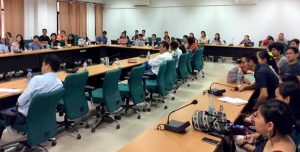Nagaland
Scholars discuss ‘changing dynamics of politics’ in Nagaland

Dimapur, August 21 (EMN) : A panel discussion on the “changing dynamics of politics in Nagaland” was organized by the Naga Scholars’ Association on August 18 at the JNU in New Delhi. A press release from the organisers on Monday stated that the discussions revolved around the ‘changing phases of politics in Nagaland and the reasons for the aforementioned changes.’
The panellist were Dr Walunir Tzudir, AC Kharingpam, and James Pochury.
According to the updates, Dr. Walunir Tzudir pointed out to how the Naga politics have in the process of having “fallen in love with the ‘ideals’ of democracy has yielded to rhetoric rather than practical engagements, aimed at addressing the need of the hour.” The Nagas, he observed, are governed by aliens who were more interested in big talks instead of providing a working solution on the ground level.
“The state of affairs of politics is such that it is reducible to a contestation for power, based on a manufactured consent that revolves around the praxis of money play and money talks,” the press release stated.
“This current picture is far different from the politics of 1990’s when there was a downright rejection of money power. The blame for this complete turnabout, in this case, lies not just with the leaders but the masses or the citizens themselves who have embraced what they have rejected earlier. This ‘job politics’ or ‘the politics of appeasement’ has led to a bankruptcy of ideas.”
This tussle for power is again complicated by the rise of different tribal blocs who for reasons “best known for their power interest” are involved in the process of integration or disintegration at the cost of each other, the panellist stated.
“This is further problematized by the growth of a corrupt bureaucratic system which is more interested in lobbying their gainful interest. Democracy as such is today reduced to a kind of the ‘press of the button’ play. And a lot can be understood and is reflected, when in the midst of all these chaos, an expected revolution in the offing simply fails even to take root instead surprisingly people themselves are caught dancing to these tunes.”
Further, AC Kharingpam, the second panellist talked about ‘what amounts to change and the importance of mapping it out, keeping in mind the reality of the existential experiences there of politics.’ He was quoted as having stressed that the change in politics was not all about what had been but ‘what had been left out or been denied or what has not been voiced out.’
To understand change, the updates stated of the panellist’s discourse, it is crucial to understand the structural ideology of the ruling class, the standings of the nationalist groups, the clergy, and the electoral class.
“Understanding this multilayer structure would result in a more comprehensive picture. The recent changes or dynamics in the structure of the politics of Nagaland can be he proposed better seen and understood through a study of various indicators, factors which do play a decisive role, such as the rise of NPF, with its pan Naga Identity, the growth or the receding influence of NPMHR, the recently declared framework agreement, the role of church, the demise of student politics such as the NSF and the NSUD and the rise of regionalism.”
Kharingpam pointed out also that ‘a lot can be figured out’ by examining issues that pertain to questions related to redefining the role of women, the question of migrants and related issues of assimilation and the cultural insecurities that arise as a result of the rapid changes. All these observation, he pointed out, was made from the point of ‘an insider who stands outside.’
Panellist James Pochury emphasized on the need for a “participatory democracy,” if at all the focus is on solution rather than the problems that revolve around issues that the Nagas are facing.
“The wedge, between the powerless and the powerful, has grown to an extent that there is no easy solution but to engage with the systemic issues. This approach, he reiterated, of looking into ways of how one can come out of the current crisis, can turn the problem into ‘issues’,” the press release stated. He explained that the direction that one needs to look into was in ‘how to engage with and strengthen participation at the grass root level.’
“The challenge and scope for political activism as a tool of critical engagements lies in asking the question how can the Nagas be in control of their lives, to decide how they want to live and let live? The answer he proposes lies not in transfer of power from one hegemonic group to another but in the transfer of power to a more ‘community-centered participatory structure’ that is reflective of a ‘non-centralized system which is more democratic,’” the press release stated, quoting the speaker.

